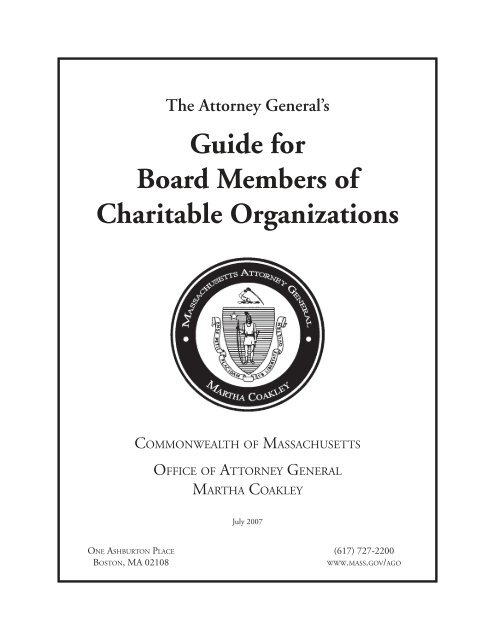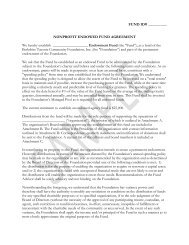Attorney General's Guide for Board Members of a ... - Mass.Gov
Attorney General's Guide for Board Members of a ... - Mass.Gov
Attorney General's Guide for Board Members of a ... - Mass.Gov
- No tags were found...
You also want an ePaper? Increase the reach of your titles
YUMPU automatically turns print PDFs into web optimized ePapers that Google loves.
The <strong>Attorney</strong> General’s<strong>Guide</strong> <strong>for</strong><strong>Board</strong> <strong>Members</strong> <strong>of</strong>Charitable OrganizationsCOMMONWEALTH OF MASSACHUSETTSOFFICE OF ATTORNEY GENERALMARTHA COAKLEYJuly 2007ONE ASHBURTON PLACE (617) 727-2200BOSTON, MA 02108WWW.MASS.GOV/AGO
Table <strong>of</strong> ContentsTABLE OF CONTENTSIntroduction .......................................................................................................................................... 1I. <strong>Board</strong> <strong>Members</strong> Have Responsibilities ..................................................................................... 3II. You Have the Right to In<strong>for</strong>mation ......................................................................................... 3III. Make Sure Your <strong>Board</strong> is Vital and Diverse .......................................................................... 4IV. Choose and Evaluate Your Chief Executive Officer Carefully ....................................... 5V. Get Involved in Setting Executive Compensation .............................................................. 6VI. Beware <strong>of</strong> Conflicts <strong>of</strong> Interest .................................................................................................7VII. Pay Close Attention to Financial Matters ............................................................................ 9VIII. Educate Yourself ...................................................................................................................... 10IX. Other Resources to Assist You in Your Responsibilities ................................................. 11The <strong>Attorney</strong> General’s <strong>Guide</strong> <strong>for</strong> <strong>Board</strong> <strong>Members</strong> <strong>of</strong> a Charitable Organization
The <strong>Attorney</strong> General’s <strong>Guide</strong> <strong>for</strong> <strong>Board</strong> <strong>Members</strong> <strong>of</strong> a Charitable OrganizationINTRODUCTIONThis guide is provided by the <strong>Attorney</strong> General’s Office to help board members <strong>of</strong> nonpr<strong>of</strong>itcharitable organizations carry out their important responsibilities. As a boardmember you have both the privilege and the responsibility <strong>of</strong> participating in thegovernance <strong>of</strong> an organization that is operated not <strong>for</strong> the benefit <strong>of</strong> private individuals,but <strong>for</strong> the benefit <strong>of</strong> the public. As the agency <strong>of</strong> the Commonwealth charged withprotecting the public’s interest in your organization’s activities, the <strong>Attorney</strong> General’sOffice deeply appreciates your willingness to serve as a board member and recognizesyour hard work and dedication per<strong>for</strong>m an extremely important service <strong>for</strong> all citizens <strong>of</strong>the Commonwealth.While portions <strong>of</strong> this guide may be helpful and applicable to all nonpr<strong>of</strong>it organizations,it should be emphasized that it is specifically designed <strong>for</strong> board members <strong>of</strong> thosenonpr<strong>of</strong>it organizations that are “public charities.” What constitutes a public charity isnot widely understood, and people are <strong>of</strong>ten surprised to learn that these organizationsrange in size, scope and complexity from our largest universities and health care systemsto small, neighborhood-based social service organizations. As a general rule theseotherwise diverse organizations are linked, not just by nonpr<strong>of</strong>it basis, but because theyoperate on an exclusively charitable basis and collect, hold and expend funds solely <strong>for</strong>the benefit <strong>of</strong> the public.Examples <strong>of</strong> nonpr<strong>of</strong>it organizations that are public charities include philanthropicorganizations as well as most <strong>of</strong> our hospitals, schools, social service providers, culturalorganizations, parent-teacher associations/organizations, and youth sports leagues.Examples <strong>of</strong> nonpr<strong>of</strong>it organizations that are not public charities, and are there<strong>for</strong>enot regulated by the <strong>Attorney</strong> General’s Office, include chambers <strong>of</strong> commerce, laborunions, social clubs, civic associations and similar organizations that benefit only theirmembers. If you have any doubt regarding your organization’s status, you shouldconsult legal counsel or contact the Non-Pr<strong>of</strong>it Organizations/Public CharitiesDivision <strong>of</strong> the <strong>Attorney</strong> General’s Office at (617) 727-2200, ext. 2101.Often we are asked what we believe are the most important things a board membercan do in order to best serve his or her organization. Here are our recommendationsin key areas <strong>of</strong> stewardship. While this guide is not intended to prescribe the exactmanner in which a <strong>Mass</strong>achusetts public charity board must function, and while werecognize that the size, <strong>for</strong>m and structure <strong>of</strong> the boards vary greatly, we believe thatthis guide will help all board members do their jobs well.Page 1
The <strong>Attorney</strong> General’s <strong>Guide</strong> <strong>for</strong> <strong>Board</strong> <strong>Members</strong> <strong>of</strong> a Charitable OrganizationI. BOARD MEMBERS HAVE RESPONSIBILITIESIf you are a trustee or a member <strong>of</strong> the board <strong>of</strong> directors <strong>of</strong> a charitable organization,you and your fellow board members are responsible <strong>for</strong> governing the organization.The law imposes upon you two primary duties: the duty <strong>of</strong> care, and the duty <strong>of</strong> loyalty.The duty <strong>of</strong> care means that you must act with such care as an ordinarily prudentperson would employ in your position. The duty <strong>of</strong> loyalty means that you must actin good faith and in a manner that you reasonably believe is in the best interest <strong>of</strong> theorganization.As discussed throughout this guide, it is your job to oversee your chief executive <strong>of</strong>ficer(CEO) and to see that the organization is faithfully carrying out its purpose withoutextravagance or waste.THIS MEANS:• You should attend board meetings and meetings <strong>of</strong> committees on which youserve. You should make sure that you receive detailed in<strong>for</strong>mation be<strong>for</strong>ehandabout matters which are going to be voted on at a meeting.• You should carefully read all <strong>of</strong> the material which you receive and prepareyourself to ask questions.• You should use your own judgment and not simply take the word <strong>of</strong> your CEO orfellow board members.IN SHORT:You should be aware <strong>of</strong> and in<strong>for</strong>med about every majoraction the charity takes.II. YOU HAVE THE RIGHT TO INFORMATIONIn order to carry out your legal responsibilities as a board member or trustee, youmust be able to make in<strong>for</strong>med judgments about important matters affecting theorganization. The law permits you to reasonably rely on in<strong>for</strong>mation from theorganization’s staff, lawyer, auditor, outside advisors, and board committees in makingthose judgments. If you do not have adequate in<strong>for</strong>mation, you have the right to get it.Page 3
The <strong>Attorney</strong> General’s <strong>Guide</strong> <strong>for</strong> <strong>Board</strong> <strong>Members</strong> <strong>of</strong> a Charitable OrganizationTHIS MEANS:• You have the right to have reasonable access to management.• You have the right to have reasonable access to internal in<strong>for</strong>mation <strong>of</strong> theorganization.• You have the right to have reasonable access to the organization’s principaladvisors, such as its auditors or attorneys, <strong>for</strong> example.• Senior management must be willing to facilitate board access to the books andrecords <strong>of</strong> the organization.• Senior management must be willing to facilitate communications between theboard and the principal advisors <strong>of</strong> the organization.• The board has the right, if necessary, to engage the services <strong>of</strong> outside advisors atthe organization’s expense to assist it with a particular matter.IN SHORT:You have the right to obtain the in<strong>for</strong>mation you need tocarry out your responsibilities as a board member.III. MAKE SURE YOUR BOARD IS VITAL AND DIVERSEA charity’s board should be vigorous and responsive to the mission <strong>of</strong> the charity. Youshould make sure that your board’s process <strong>of</strong> selecting new members assures diversity<strong>of</strong> viewpoints and rotation <strong>of</strong> board members and <strong>of</strong>ficers. As a board member, youhave responsibility <strong>for</strong> ensuring that the public and charitable role <strong>of</strong> the organizationwill be carried out in a way that is effective in furthering the mission <strong>of</strong> the charity.A nominating process which invites openness, variety, and change is important toachieving this goal.THIS MEANS:• Your nominating process should reach out <strong>for</strong> candidates, and actively recruitindividuals whose commitment, skills, life experience, background, perspective, orother characteristics will serve the organization and its needs.Page 4
The <strong>Attorney</strong> General’s <strong>Guide</strong> <strong>for</strong> <strong>Board</strong> <strong>Members</strong> <strong>of</strong> a Charitable Organization• A larger candidate pool may result if you include non-board members as well asboard members on your nominating committee.• Term limits <strong>for</strong> board members are an effective way to ensure board vitality.If your board does not have term limits, board members should be reviewedperiodically to confirm that they remain interested in and suitable <strong>for</strong> the board.Rotation <strong>of</strong>f the board, assignments to <strong>of</strong>f-board committees, and designation asemeritus members are other ways to achieve a vigorous board.IN SHORT:To avoid becoming labeled as a closed club <strong>for</strong> “insidersonly,” choose board members who have an interest inthe organization’s mission, represent diverse viewpoints,and have a willingness to learn, and then be sure thereare opportunities <strong>for</strong> board renewals.IV. CHOOSE AND EVALUATE YOUR CHIEF EXECUTIVE OFFICER CAREFULLYHiring the organization’s CEO is one <strong>of</strong> the most important tasks you have. It is thejob <strong>of</strong> the board to engage in a selection process which will allow the board to findthe right person to carry out the charity’s purpose efficiently and effectively. Theorganization <strong>for</strong> which you are responsible can only benefit when the entire boardparticipates in hiring and evaluating its chief executive employee.THIS MEANS:• The board should <strong>for</strong>m a search committee at the beginning <strong>of</strong> the hiringprocess. If the board does not create a written job description <strong>for</strong> the CEOposition prior to hiring, it should at least develop a pr<strong>of</strong>ile <strong>of</strong> the sort <strong>of</strong> CEO itbelieves the organization’s mission and current needs require.• A majority <strong>of</strong> the search committee members should be board members, but itmay be beneficial to include staff members and others knowledgeable about theorganization and its mission .Page 5
The <strong>Attorney</strong> General’s <strong>Guide</strong> <strong>for</strong> <strong>Board</strong> <strong>Members</strong> <strong>of</strong> a Charitable Organization• If the size <strong>of</strong> the board permits, the entire board should interview the finalcandidates and participate in contacting their references.• The entire board should make the final decision to hire the CEO.• After the CEO is hired, the board should periodically review and assess thechief executive’s per<strong>for</strong>mance, keeping in mind that the board has the authorityto discharge as well as hire the CEO.IN SHORT:<strong>Board</strong> members should actively participate in selectingand evaluating the charity’s CEO.V. GET INVOLVED IN SETTING EXECUTIVE COMPENSATIONThe board is responsible <strong>for</strong> setting the compensation <strong>of</strong> the organization’s CEO andother senior managers. When setting executive compensation, you should be mindfulthat the public, which supports the charity and uses its services, is interested in knowingthe amount. This in<strong>for</strong>mation is provided to the public by the Non-Pr<strong>of</strong>it Organizations/Public Charities Division <strong>of</strong> the <strong>Attorney</strong> General’s Office and by the Internal RevenueService (IRS), and is available online to anyone who wishes to review an organization’sForm 990 at www.guidestar.org, an independent database <strong>of</strong> nonpr<strong>of</strong>it organizations.In addition, both the IRS and the Non-Pr<strong>of</strong>it Organizations/Public Charities Division fromtime to time scrutinize the reasonableness <strong>of</strong> a charity’s executive compensation andthe process used by the board to determine this compensation. Complaints <strong>of</strong> excessivecompensation or private benefit, whether from regulators or from the public, canexpose the organization to legal action and damage its good name.THIS MEANS:• Every board member should know what the CEO and other senior managersare paid, including the value <strong>of</strong> any non-salary compensation, such as the use <strong>of</strong>an automobile, retirement funds, etc.• If a compensation committee is used, it should not make the final decision. Insetting compensation, you should consider the per<strong>for</strong>mance <strong>of</strong> your CEO andsenior managers and the compensation provided to other similarly situatedPage 6
The <strong>Attorney</strong> General’s <strong>Guide</strong> <strong>for</strong> <strong>Board</strong> <strong>Members</strong> <strong>of</strong> a Charitable Organizationexecutives in the field. If the board chooses to engage a compensationconsultant to gather or review this in<strong>for</strong>mation, it should not rely solely on therecommendations <strong>of</strong> the consultant, however. <strong>Board</strong> members are responsible<strong>for</strong> determining what level <strong>of</strong> compensation is reasonable <strong>for</strong> their organization,taking into account other important factors such as the concerns <strong>of</strong> donors,the impact on the charity’s mission and finances, and the good name <strong>of</strong> theorganization.IN SHORT:Your process <strong>for</strong> setting executive compensation, theamount <strong>of</strong> such compensation, and the terms <strong>of</strong> suchcompensation should all be well documented, approvedby the full board, and be sensitive to public concerns andregulatory oversight.VI. BEWARE OF CONFLICTS OF INTERESTYou, or a business you control or benefit from financially, may be considering whetheror not to engage in a transaction with the organization on whose board you are sitting.A situation <strong>of</strong> this type presents a potential conflict between your own financial interestsand your duty as a board member to be absolutely loyal to the organization. It also maylook questionable to the public.Because <strong>of</strong> these problems, a board member or related entity should be cautiousabout entering into a business relationship with the organization the board memberis overseeing, and the board should be very cautious about allowing the organizationto enter into such a relationship. Such a transaction should not occur unless the boarddetermines it is clearly in the best interest <strong>of</strong> the charity. Prior to the board vote, theboard member should fully disclose his or her financial interest to the entire board, andthe board member should not vote on any aspect <strong>of</strong> the arrangement or be presentwhen it is being discussed or voted upon.THIS MEANS:• You should ensure that your board has a policy <strong>for</strong> dealing with conflicts <strong>of</strong>interest.Page 7
The <strong>Attorney</strong> General’s <strong>Guide</strong> <strong>for</strong> <strong>Board</strong> <strong>Members</strong> <strong>of</strong> a Charitable Organization• The policy should include a procedure <strong>for</strong> the annual written disclosure by allboard members and senior managers or key decision makers in theorganization <strong>of</strong> their business involvements with the charity and their otherboard memberships and business interests, both <strong>for</strong>-pr<strong>of</strong>it and charitable.The in<strong>for</strong>mation disclosed should be circulated to all board members and beupdated throughout the year as necessary. The <strong>Attorney</strong> General’s Non-Pr<strong>of</strong>itOrganizations/Public Charities Division requires that the value and terms <strong>of</strong> theserelated party transactions be disclosed on the organization’s annual Form PCfiling. (Please visit the <strong>Attorney</strong> General’s Office website, www.mass.gov/ago,to see the Instructions to Form PC <strong>for</strong> additional in<strong>for</strong>mation on related partydisclosures.)• Your conflict-<strong>of</strong>-interest policy should address the issues raised if board membersor other senior managers have or might acquire investments that may affect orbe affected by the charity’s investment decisions. In addition, it should addressother conflicts that can be reasonably <strong>for</strong>eseen, based on the organization’scharitable activities. For example, a grant-making organization should considerhow to address grant applications from an entity that has an employee or boardmember serving on the grant-making organization’s board.• In addition to the disclosure <strong>of</strong> financial interests and conflicts <strong>of</strong> interest, thepolicy should also include a procedure <strong>for</strong> the withdrawal from discussion andvoting by the board member or senior manager with a conflict. This procedureshould be followed whenever the charity enters into a business transaction witha board member or senior manager, or with an entity in which a board memberor senior manager has an interest.• It may be advisable to obtain an outside evaluation or appraisal <strong>of</strong> any majorbusiness transaction that is being proposed between the charity and a boardmember or manager or any entity in which a board member or manager hasan interest. This evaluation is to assure that the proposal is feasible, the termsare favorable to the charity, and the potential pitfalls <strong>of</strong> such a transaction to thecharity have been identified.• The board should carefully consider the pros and cons <strong>of</strong> entering intorelationships, such as management contracts, the creation <strong>of</strong> subsidiary entities(whether they are <strong>for</strong>-pr<strong>of</strong>its or nonpr<strong>of</strong>its), and other transactions that involveinherent conflicts <strong>of</strong> interest because the board’s duties <strong>of</strong> care and loyalty arebeing divided among several entities or delegated, even in part, to another entity.• Because <strong>of</strong> the sensitivity <strong>of</strong> conflict-<strong>of</strong>-interest issues, you may want to requirethat transactions involving these issues receive a greater-than-majority vote.Page 8
The <strong>Attorney</strong> General’s <strong>Guide</strong> <strong>for</strong> <strong>Board</strong> <strong>Members</strong> <strong>of</strong> a Charitable OrganizationIN SHORT:Any conflict transaction should be scrutinized veryclosely by the board, both because <strong>of</strong> the dynamic itcreates within the board and because <strong>of</strong> the predictableskepticism with which the public and regulators will viewthe transaction, no matter how scrupulously a carefulpolicy is followed.VII. PAY CLOSE ATTENTION TO FINANCIAL MATTERSAs a board member you have primary responsibility <strong>for</strong> making sure that thecharity is financially accountable, that it is not allowing charitable assets to be usedinappropriately or diverted to private interests, that it has mechanisms in place to keep itfiscally sound, and that it is properly using any restricted funds it may have.THIS MEANS:• The board should make sure that a realistic annual budget is developed.• The budget should be developed early enough that the entire board can beinvolved in its review and approval be<strong>for</strong>e the beginning <strong>of</strong> the fiscal year.• The board should be sure that the charity has adequate internal accountingsystems and controls. At a minimum, the board should discuss and approve alldelegations <strong>of</strong> its signatory authority, put these delegations in writing, and reviewthem annually. In addition, the board should consider requiring board actionon large or especially significant contracts or grants, and on all transactionsinvolving real estate, borrowing, or sale/disposal <strong>of</strong> large assets. <strong>Board</strong> membersshould expect management to produce timely and accurate income and expensestatements, balance sheets, and budget status reports, and should expect toreceive these in advance <strong>of</strong> board meetings. These reports ought to be easilyunderstood by the majority <strong>of</strong> board members and board members should takean active role in reviewing and questioning the in<strong>for</strong>mation in them.• The board should require periodic confirmation from management that allrequired filings (such as tax returns and the <strong>Mass</strong>achusetts Form PC) are up-todateand that employee withholding taxes and insurance premiums are beingpaid when due.Page 9
The <strong>Attorney</strong> General’s <strong>Guide</strong> <strong>for</strong> <strong>Board</strong> <strong>Members</strong> <strong>of</strong> a Charitable Organization• The board should consider the value <strong>of</strong> having independent audits andmaintaining standing audit and finance committees. However, if thesecommittees are established, the full board should still receive and act on thereport <strong>of</strong> the independent auditor, receive periodic financial reports, and approvethe budget.• The board should make sure that fundraising is done honestly and with integrity.The board also should make sure that any contract with an outside pr<strong>of</strong>essionalfundraiser is fair and reasonable, and that the fundraiser’s per<strong>for</strong>mance ismonitored.• The board should confirm that any restricted gift to the charity is separatelyaccounted <strong>for</strong>, and that the funds are being used in accordance with the terms <strong>of</strong>the restriction.IN SHORT:The board should be in<strong>for</strong>med about all aspects <strong>of</strong> theorganization’s finances and is ultimately responsible <strong>for</strong>the financial health and integrity <strong>of</strong> the organization.VIII. EDUCATE YOURSELFA member <strong>of</strong> the board <strong>of</strong> a charity should be knowledgeable about his or her role inthe governing process, the mission <strong>of</strong> the organization, and the unique operational,legal, and financial issues facing the organization.THIS MEANS:• You should have a copy <strong>of</strong>, and be familiar with, the articles <strong>of</strong> organization <strong>of</strong>your organization and the by-laws <strong>of</strong> your board.• The board should review what training and education it may need on a regularbasis.• Particular attention should be given to providing orientation to new boardmembers.• Programs and materials should draw on the expertise <strong>of</strong> specialists in the fieldsrelated to your board responsibilities.Page 10
The <strong>Attorney</strong> General’s <strong>Guide</strong> <strong>for</strong> <strong>Board</strong> <strong>Members</strong> <strong>of</strong> a Charitable Organization• If your board does not have a board manual containing governing documents,copies <strong>of</strong> the most recent audit and budget, and other orientation materials, itmay want to consider developing one.IN SHORT:As a board member, you must take the initiative toeducate yourself on an ongoing basis about your roleand responsibilities, and the board as a whole must takeresponsibility <strong>for</strong> its own training and orientation.IX. OTHER RESOURCES TO ASSIST YOU IN YOUR RESPONSIBILITIESThe <strong>Attorney</strong> General’s website provides access to a number <strong>of</strong> useful publications,advisories, and reports produced by the Non-Pr<strong>of</strong>it Organizations/Public CharitiesDivision. These may be viewed online or downloaded from www.mass.gov/ago.In addition, the division has posted on the website a number <strong>of</strong> links to in<strong>for</strong>mationprovided by others, including the IRS, <strong>Guide</strong>star.org, and nonpr<strong>of</strong>it oversight andadvocacy organizations. Finally, all <strong>for</strong>ms and instructions issued by the division are alsoavailable on the website.Page 11
OFFICE OF ATTORNEY GENERALMARTHA COAKLEYNON-PROFIT ORGANIZATIONS/PUBLIC CHARITIES DIVISIONONE ASHBURTON PLACEBOSTON, MA 02108(617) 727-2200WWW.MASS.GOV/AGO





